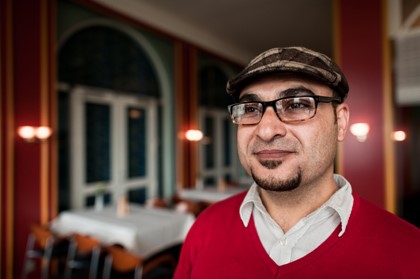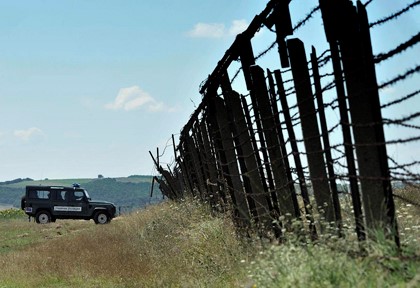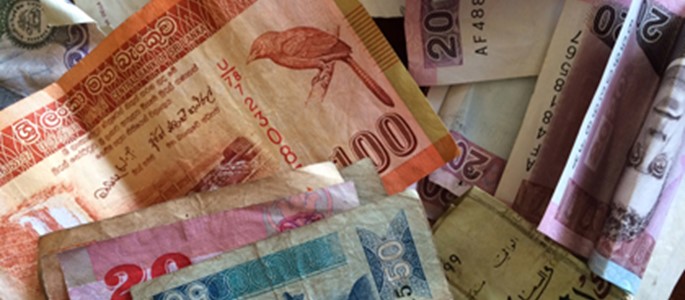Human smugglers are the only hope for refugees
Refugees pay from 35,000 to 110,000 DKK to reach Europe. They often sell all possessions or become indebted to afford the journey.
49,000 DKK from Eritrea to Denmark via Sudan, Libya and Italy. 80,000 DKK to come from Syria to Turkey, and from there to Greece and finally to Denmark. 110,000 DKK by plane with a fake passport from Syria.
REFUGEES.DK have spoken with 12 refugees about how much their dangerous journey with human smugglers has cost, from their homelands and all the way to Denmark. The figures show that refugees pay greatly varying sums to get to Europe. While the numbers differ, their journeys generally have one thing in common – it has taken them several months to get here, through deserts, over seas, on country roads, by foot, in boats, in containers. From Syria it costs an average of 8-9,000 euro, from Eritrea ca. 5-6,000 dollars, one Afghan refugee has related that he paid 16,000 dollars to travel from Afghanistan to Denmark via Turkey and Greece, while another made the same journey for 8,000 dollars, albeit with a nine month spell in Athens waiting to raise the money for the train journey to Denmark.
The interviews were made as part of the large project The Migrant Files: The Money Trails, where data on the cost of the refugees' journeys have been collected from many countries.
Life in Turkey didn't work out
Fawaz paid 8,500 euro. He is now 40 years old, and he lived in his hometown in Northern Syria, close to the Turkish border, until last year. There, he worked as a schoolteacher but after several years of civil war, the oil-rich area was invaded by gangs, the mafia and the military – and IS.
“You never imagine that things will get so bad that you could be forced to leave your country. This is the place where you have your career, your family, your memories, your successes. It wasn’t what I wanted and therefore I held out as long as I could before I decided to go to Istanbul. The plan was to settle down there until the war was over”, tells Fawaz to REFUGEES.DK.
“But I also ended up in the hands of human smugglers.”

It turned out it wasn’t so easy to establish a new life in Istanbul. Turkey had tightened the rules and as a Syrian citizen, you were entitled to a residency visa but were no longer entitled to a work visa. It was also no longer possible for refugees to rent an apartment in their own name.
“For example, I couldn’t get any health insurance, so the situation was very insecure. Once, I ended up in hospital with a minor injury and ended up paying three months wages for it”, explains Fawaz, and continues:
“I had a good life in Syria. Ok, criticising the government wasn’t allowed but things worked before the war. We were a country with possibilities – it was safe and there was very little crime. We earned money, went out in the evenings and in many ways, lived just like Europeans. I loved my country. So when I found out that it wasn’t possible to start again in Turkey, I looked towards Europe. Europe, where there is human rights and democracy, where you don’t have to be afraid that society is about to collapse. That meant so much for me.”
A horrendous journey
After a time in Istanbul, Fawaz made contact with a human trafficker, who offered a boat to the Greek islands and a truck onwards to Denmark for 8,500 euro. This is a classic route, which is highly watched today, and therefore risky. Despite this, many succeed in making the journey, and over 7,000 refugees arrived to the island of Lesbos in May alone.
“I had sold my car and my things before I came to Turkey, and my father had also sold some possessions in order to raise the 8,500 euro. I often hear the preconception that we’re all economic refugees, but that wasn’t the case for me – I ran from war and the only way I could get to safety in Europe was with the traffickers”, says Fawaz, continuing:
“I tried to get to Greece for two and a half months. Every time we tried, it was either too risky or we were caught. In the end, we made it though and we were 56 people on board a 6m long boat. The journey, which normally takes 2-3 hours, took 23. It was horrendous. After that, we took a lorry towards Denmark.”
Fawaz left his parents and sister in Syria, but had no wife or children. He was granted asylum on the 21st April and has since moved to Hobro, where he will start his new life.
“I moved here two weeks ago and don’t know anyone in the town, so it’s all a little overwhelming right now. My goal is to learn Danish and get a work experience placement and ultimately, get a job. It’s hard to be away from my family though, their situation worries me”, tells Fawaz.
“But my father refuses to leave Syria. It’s his land, he says. In a way, I can understand him but I also wish he was a little less stubborn.”
Easier under Gaddafi
Back when Gaddafi was in power, it was much easier and cheaper to come through Libya, Bereket from Eritrea tells REFUGEES.DK. Today, it’s a violent journey through the Sahara, often in the company of unscrupulous smugglers. The smugglers take everything you own, including food and water, fill themselves with drugs and drive like maniacs through the desert with 30 people on a pick up. If you fall off, they abandon you under the burning sun. If you can’t raise the money to travel further, they kill you.
Amnesty International has documented a massive trade in organs belonging to Eritreans who couldn’t pay the smugglers, taking place in the Sinai desert. Children are also kidnapped and held until there is a buyer ready for one of their organs from one of the large private hospitals in India and Dubai.
Despite the fact that the risks are all too real, today many Eritreans undertake the danger-filled journey from Eritrea over the Sahara, through Sudan and Libya towards the Mediterranean and Europe. Conditions in Eritrea leave them with no choice. However, many of the younger Eritreans don’t have the money to make such a journey, explains Bereket.
“Many of the young ones haven’t told their parents or families about their plans to flee. They make plans together with other youths and raise the money to get to Sudan or Ethiopia, because they just want to get out of Eritrea. In the neighbouring countries, they’ll work for a few months to raise the money to get to Libya, but once they get there, they’re often lacking the 1,800-2,000 dollars it costs to get over the Mediterranean in a boat to Europe” says Bereket, adding: “When the smugglers find this out, they take their mobile phones, call the families of the youths and say that they have to pay for the trip. They’re then put into a smuggler's house, where they’ll be beaten, raped and starved until family members, often from the West, raise the money.”
Bereket also waited in an underground smugglers house in Libya. He sat there together with many others, among them were eight other refugees from Eritrea, who had been there for over three months. He had saved up for the journey, but the other eight couldn’t raise the sum required to get further. One day, an Eritrean trafficker came to the underground house. He had met the eight refugees before and when the next boat was ready, the smuggler paid out of his own pocket so that his countrymen could get a place on the boat. He was one of the good ones, says Bereket, who has also heard how some refugees threw one of their smugglers overboard in the middle of the sea, when they could no longer tolerate his cruelty.
‘There’s just as great a difference among smugglers as there is among all other people. Some are helpful and friendly, others are full of evil and violent’, says Bereket. He is of the opinion that politicians shouldn’t focus on the smugglers and the chance to be rescued. The majority of refugees are ambivalent about how small the chances for rescue are. And he knows what he’s talking about:
“11 from my group died of thirst on the way to Libya, and my brother drowned when he tried to cross the Mediterranean. My sister is in Libya right now, despite the fact that I’ve warned her again and again not to come over. But death by drowning isn’t something to be afraid of, when you otherwise risk dying in an Eritrean jail or dying of thirst in the desert”.

Devaluation of human life
Although refugees are a hot topic in both Denmark and the EU, the majority of them choose to stay in the surrounding areas. Lebanon, for example, has taken in over 1.1 million refugees – despite the fact that the country has an area under a quarter of the size of Denmark – and five million Syrians are currently located in the surrounding countries, while a further eight million are internally displaced within Syria itself. Only a small fraction of the world’s refugees make it as far as Europe – and without help from human smugglers, it would be impossible.
‘It’s about time that Europe started to take some responsibility,’ says Martin Lemberg-Pedersen, researcher in asylum at Copenhagen University.
‘Europe’s asylum systems are schizophrenic. On the one hand, they extol human rights and the right to asylum, while on the other they have gradually introduced more and more restrictions, making it more difficult for people to demand those rights. It’s no longer possible to apply for asylum at embassies and even airlines carry out border control. So the only resort is to use human smugglers.’
Martin Lemberg-Pedersen is worried about what he calls the devaluation of human life. He states that even when thousands of people drown, the refugee crisis is still not taken seriously in Europe.
‘Politicians argue in favour of stopping the human smugglers. But what should the refugees do then? At the same time that they dehumanise refugees, they make seeking refuge a crime. Europe should instead focus on solutions such as distribution plans and how to differentiate between those who have legitimate reasons to flee and those who don’t,’ adds Martin Lemberg-Pedersen.
He continues:
“We should also be careful not to be too quick to judge. Often, a refugees best option is to get into a small boat and hope that someone finds them somewhere on the Mediterranean. The European side gambles on the fact that there are refugees who won’t make it to Europe, either because they drop out along the way or don’t dare to take the chance. So in the end, it all comes down to one thing, and that’s empathy.”
Due to the situation of their families in their homelands, Fawaz is only referred to by first name and Bereket is a pseudonym. The editors know their full identities.
Facts: what refugees have paid
Man from Syria, Fawaz: 63,000 kroner
Waited two and a half months to get away. Paid ca. 8,500 for the trip between Turkey and Greece with boat and a lorry towards Denmark. A friend of Fawaz made the journey through Eastern Europe by lorry. This also cost 8,500 euro.
Man from Syria, JM: 110,000 kroner
The journey went from Turkey. Here, he spent a month in a room together with 27 other refugees. For his money, he got a false passport and came to Denmark by plane from Turkey.
Man from Syria, AB: 80,000 kroner
His escape took him six and a half months. It cost 400 dollars from Syria to Turkey, 5,000 dollars from Turkey to Greece, 4,500 euro from Athens to Copenhagen via Rome. He also paid an extra fee of 2,000 euro. All in all, 80,000 Danish kroner.
Man from Afghanistan, ER: 112,000 kroner
Paid 16,000 dollars in all; 5,000 dollars from Afghanistan to Turkey, 2,500 dollars from Turkey to Greece, 6,000 dollars from Greece to Italy. From Italy, he continued without the aid of traffickers. When he arrived at Sandholm nearly four months later, he had just 30 dollars out of the 16,000 left in his pocket.
Man from Afghanistan, AD: 56,000 kroner
Came to Denmark three years ago. Paid ca. 8,000 dollars but got stuck in Athens for nine months before he could raise the money to come the rest of the way to Denmark by train.
Couple from Eritrea, ST and GA: 35,000 kroner per person
Used 2,000 dollars on the trip to Libya and 2,000 a head for the boat over the Mediterranean. From here, a further 2,000 dollars each to come from Italy to Denmark, via Germany.
Man from Eritrea, AZ: 49,000 kroner
Paid 7,000 dollars in all, including living costs, to flee to Denmark. His journey went through Sudan, Libya, over the Mediterranean, through Italy and then to Denmark direct by train.
Man from Eritrea, AA: 43,000 kroner
Paid 1,600 dollars to come from Ethiopia to Sudan, 1,700 dollars from Sudan to Libya, 1,850 dollars for the boat across the Mediterranean and 1,000 euro from Italy to Denmark.
Man from Eritrea, TH: 35,000 kroner
Paid 5,000 dollars for a journey through Sudan, Libya, Italy and on to Denmark.
Man from Eritrea, JM: 42,000 kroner
Paid 6,000 dollars for the same journey as the man above.


